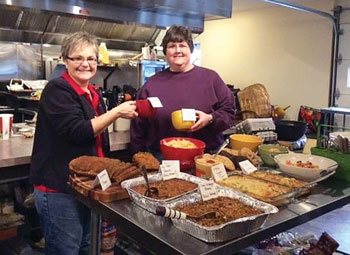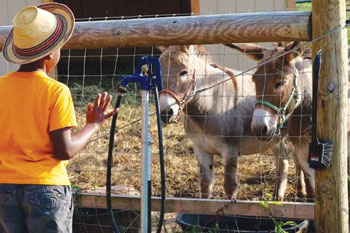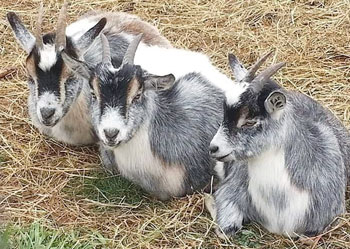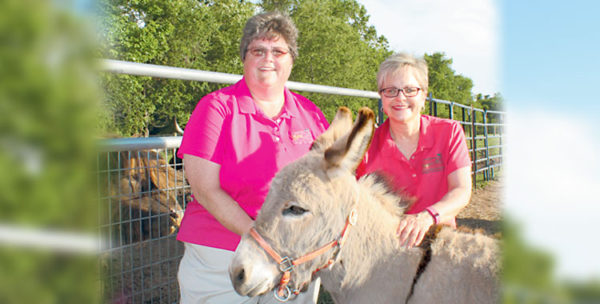Planting the Seeds of Knowledge
by BusinessWoman magazine / 0 Comments / 876 View / June 30, 2017
What happens when two middle-aged women decide to pursue their dream of owning and running a not-for-profit teaching farm?
As Bonnie McCann, co-founder of Loaves and Fishes Farm, put it, they simply “manage to find a way to make some stuff grow and help others get excited about what they’re eating and who’s eating it with them.”

Bonnie feeding Buttons, nicknamed “Maybelline,” a Scottish Highland and Texas Longhorn cross.

Bonnie and Jen in the kitchen and classroom. Photo by Margee Kooistra.
McCann grew up in the Washington, D.C., suburbs but spent a lot of time with her grandparents on Cape Cod, where she learned to love cooking from her grandmother.
“I inherited her enthusiastic—if messy—cooking methods,” McCann said.
While growing up, her family always had a garden.
“I remember lugging gallon milk jugs full of water back and forth and swearing that I didn’t care if I ever saw another zucchini squash,” she recalls.
Her Loaves and Fishes partner, Jen Briggs, grew up locally and she, too, enjoyed a childhood full of the joys of farming.
“We always had gardens or cattle or something—somewhat homesteading,” she said. “My grandparents were avid farmers and gardeners … my memories of my childhood are of great times and lots of family around harvesting, canning, and freezing.”
She also benefitted from the knowledge both of her grandmothers shared and their passion for feeding their families using foods they grew and made themselves.
“It was nothing for them to do 300 quarts of one thing or another each year for canning … or baking 30 loaves of bread or pies at a time.”
Briggs and McCann met at a church event and hit it off immediately, realizing they had many common interests, including cooking and agriculture.
“We were both doing energy auditing and teaching at Harrisburg Area Community College for workforce development grants, and we were meeting a lot of great people … but we noticed that these nice people did not know basic skills for daily living,” Briggs said.

First-graders on a farm tour learning about animals, plants, bees, composting, and recycling. Picture by Helene Briggs.

Farm visit from Market Square Presbyterian Church of Harrisburg’s Alternative Worship Experience group.

Three little billy goats. Photo by Bonnie McCann.
They began to consider how and where they could teach these life skills, along with encouraging an increased environmental awareness and a more sustainable lifestyle.
“Having a (teaching) farm seemed like a natural progression,” McCann said. “We thought about what we could do if we had some acreage—what could we grow? How much could we share?” Briggs said.
Finding just the right place, though, was a challenge until a farmer friend told them about a place in York County. Although it wasn’t exactly what they’d had in mind, McCann and Briggs went to the auction just to see what would happen. What happened was the purchase of the farm.
“When the auctioneer said ‘sold,’ he was pointing at us,” McCann said. “The two middle-aged women had just ‘bought the farm,’ as they say.”
The name Loaves and Fishes Farm comes from the faith that Briggs and McCann share.
“The parable of loaves and fishes focuses on bounty and the joys of sharing what you have with others,” McCann said. It seemed to fit perfectly into their plans for the farm.
Loaves and Fishes Farm focuses on and works to be as environmentally conscious as possible.
“We try not to use harsh chemicals, we try to get as much out of the land in the area as we can, and we try to use sustainable practices,” Briggs said. “Bonnie is a certified permaculturalist, and my concentration is to try to do as much as we can with the budget money that we have.”
At the farm, McCann and Briggs are currently working with hydroponics and hope to soon begin experimenting with aquaponics.
They use soil-based raised beds and have a small orchard, a greenhouse, and “lots of animals,” McCann said.
In the permaculture tradition, everybody on the farm has a job. For example, the goats that make Loaves and Fishes their home are responsible for “lawn care and weed whacking,” McCann said. “So we have goats named John Deer, Black and Decker, Troy and Toro, Stihl and Echo, and—fattest of all—Husqvarna, whom we call Husky.”
Briggs and McCann turned the four-bay garage that came with the farm into a commercial kitchen and classroom, which is a constant “hub of activity,” Briggs said.
“We hold different classes … our goal is to teach life skills that perhaps somebody did not learn in school or that maybe their grandparents did and it was a lost art. We are trying to bring back some of those skills that are essential for living … If you make/bake bread, you learn math, science, and perhaps the art of sharing.”
Because they both have full-time jobs in addition to their duties on the farm, life can get pretty hectic at times for McCann and Briggs.
“When we are in the planting season, we have to make sure we are weeding and watering and fertilizing properly … and we are also using our hydroponics equipment, which turns over every seven to eight days or every six to eight weeks, depending on which piece of equipment we are using … and that doesn’t have anything to do with running the classes or marketing or anything else that we do,” Briggs said.
They are also learning constantly about how to improve their methods and appreciate the knowledge shared by those who have been in the business of farming for generations. McCann, who works with the Pennsylvania Department of Agriculture, said that “for someone who loves food and farming like I do, it’s great to be surrounded by people who know all about the different facets of agriculture.”
Although the original goal of the farm was to teach life skills, something they are doing successfully, Briggs and McCann also are sometimes surprised by how those who visit the farm are affected by spending time there.
One example involves the three official farm cats, affectionately named Fred, Wilma, and Pebbles—or the Flintstones—because their home is near a pile of rocks. The cats’ mission was revealed, McCann said, when “we had visits from some teenaged girls who cut themselves. Several times we have found these girls sitting on a bench in the Flintstones’ kitty condo. Their parents have told us how therapeutic those visits have been.”
“Sometimes young people just hang out with the animals, or we’ll set them up with the planting project [where] they can see the results,” Briggs said. “There’s no peer pressure at the farm other than the animals wanting to have equal amounts of attention, and they learn that they don’t have to hurt themselves and that they are worthy in that they can set their minds to do anything that they want to do.”
Running a not-for profit entity is exhausting, labor intensive, and costly—but it’s also given both McCann and Briggs a great deal of satisfaction and reassurance that they did the right thing by pursuing their dream.
“Loaves and Fishes Farm has given me some new metrics for measuring success,” McCann said. “When you invite an I’m-only-here-because-my-parents-dragged-me-here teenager out to collect eggs and then show them how to mix and cut pasta dough, then cook it and eat it … they’ll often say, ‘Well, that wasn’t so hard.’ Those words are music to my ears. Even if they never again make their own noodles from scratch, they’ve become empowered consumers who can make informed choices about how easy or hard it is to produce and prepare their own food.”
“There are often times, you know, when it’s raining or snowing … that I wonder why we’re doing this because it would be a lot easier just to write a check somewhere to donate,” Briggs said.
“But then I get a lot of personal satisfaction when I walk through the farm and see things growing, and when all the animals are fed, there’s a peacefulness there … I do continue to struggle on how to help people the most … but it is our hope that anybody who comes to the farm leaves with something positive.” BW


Your Commment
You must be logged in to post a comment.